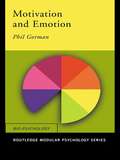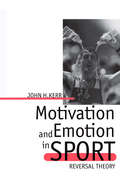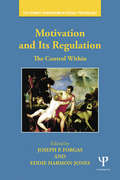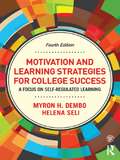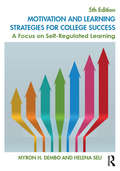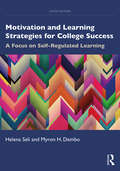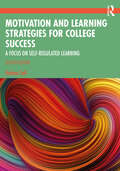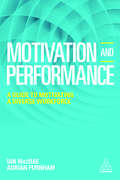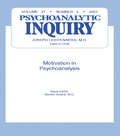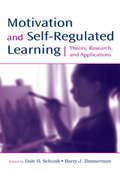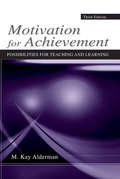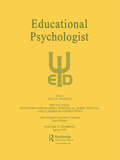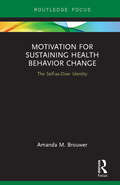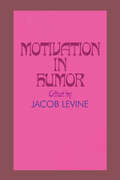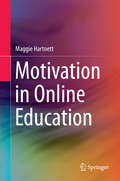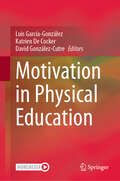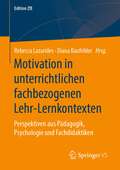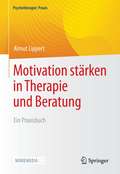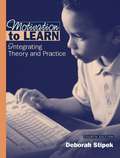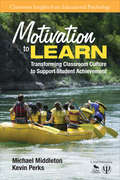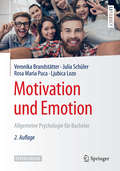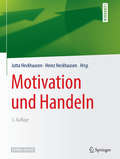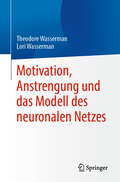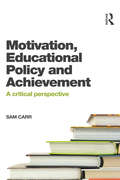- Table View
- List View
Motivation and Emotion (Routledge Modular Psychology)
by Philip GormanMotivation and Emotion provides an explanation of emotional experience and aspects of human behaviour using psychological, physiological and alternative approaches. The brain mechanisms that govern motivations are discussed and questions such as 'Why don't we eat ourselves to death?' and 'How do we know we are thirsty?' are answered. Phil Gorman is an A-Level teacher at Stafford College, UK, and a chief examiner for the Edexcel A Level Examination Board.The Routledge Modular Psychology series is a completely new approach to introductory level psychology, tailor-made for the new modular style of teaching. Each book covers a topic in more detail than any large textbook can, allowing teacher and student to select material exactly to suit any particular course or project. Especially written for those students new to higher-level study, whether at school, college or university, the books include the following designed features to help with technique: practise essays with specialist commentary to show how to achieve a higher grade chapter summaries and summaries of key research glossary and further reading progress and review exercises. Series editors: Cara Flanagan is a Reviser for AS and A2 level Psychology and an experienced teacher and examiner. Philip Banyard is Associate Senior Lecturer in Psychology at Nottingham Trent University and a Chief Examiner for AS and A2 level Psychology.
Motivation and Emotion in Sport: Reversal Theory
by John H. KerrWhy did Michael Jordan quit basketball and take up baseball? Why was Martina Navratilova so successful as a professional tennis player? These and many other questions about aspects of motivation and emotion in sport are addressed in this book which is newly available in paperback. Reversal theory's systematic conceptual framework allows a unique perspective for interpreting behaviour in sport contexts. Within each chapter, real-life examples are combined with research findings to provide an understanding of the emotional background and changes which accompany the individual's unique experience in sport. In addition, suggestions as to alications of reversal theory in new areas of sport psychology and the future direction of reversal theory-based sport research are outlined. For those interested in a truly insightful understanding of human behaviour in sport, this book will be required reading.
Motivation and Its Regulation: The Control Within (Sydney Symposium of Social Psychology)
by Eddie Harmon-Jones Joseph P. ForgasIt is motivation that drives all our daily endeavors, and it is motivation, or the lack of it, that accounts for most of our successes and failures. Motivation, however, needs to be carefully controlled and regulated to be effective. This book surveys the most recent psychological research on how motivational processes are regulated in daily life to achieve desired outcomes. Contributors are all leading international investigators, and they explore such exciting questions as: What is the relationship between motivation and self-control? What is the role of affect and cognition in regulating motivation? How do conscious and unconscious motivational processes interact? What role do physiological processes play in controlling motivation? How can we regulate aggressive impulses? How do affective states control motivation? Can motivation distort perception and attention? What are the social, cultural and interpersonal effects of motivational control? Understanding human motivation is not only of theoretical interest, but is also fundamental to applied fields such as clinical, counseling, educational, organizational, marketing and industrial psychology. The book is also suitable as an advanced textbook in courses in motivational sciences, and is recommended to students, teachers, researchers and applied professionals as well as laypersons interested in the psychology of human motivation and self-control.
Motivation and Learning Strategies for College Success
by Myron H. Dembo Helena SeliThis popular text combines theory, research, and applications to teach college students how to become more self-regulated learners. Study skills are treated as a serious academic course of study. Students learn about human motivation and learning as they improve their study skills. The focus is on relevant information and features designed to help students to identify the components of academic learning that contribute to high achievement, to master and practice effective learning and study strategies, and then to complete self-regulation studies whereby they are taught a process for improving their academic behavior. A framework organized around six components related to academic success (motivation, methods of learning, time management, control of the physical and social environment, and monitoring performance) makes it easy for students to understand what they need to do to become more successful in the classroom. Pedagogical Features include Exercises; Follow-Up Activities; Student Reflections; Chapter-end Reviews ; Key Point; and a Glossary. New in the Fourth Edition: More emphasis on research findings; expanded discussion of motivation ; more emphasis on the impact of students' use of social networking and technology; research about neuroscience in relationship to motivation and learning; new exercises, including web-based activities; Companion Website, including an Instructor's Manual
Motivation and Learning Strategies for College Success: A Focus on Self-Regulated Learning
by Myron H. Dembo Helena SeliCombining theory, research, and applications, this popular text guides college students on how to become self-regulated learners. Students gain knowledge about human motivation and learning as they improve their study skills. The focus is on relevant information and features to help students to identify the components of academic learning that contribute to high achievement, to master and practice effective learning and study strategies, and then to complete self-regulation studies that teach a process for improving their academic behavior. A framework organized around motivation, methods of learning, time management, control of the physical and social environment, and monitoring performance makes it easy for students to recognize what they need to do to become academically more successful. Pedagogical features include Exercises, Follow-Up Activities, Student Reflections, Chapter-end Reviews, Key Points, and a Glossary. New in the Fifth Edition Discussion of the importance of sleep in learning and memory Revised and updated chapter on self-regulation of emotions Current research on impact of students’ use of technology including digital learning platforms and tools, social media, and online learning Updated Companion Website resources for students and instructors
Motivation and Learning Strategies for College Success: A Focus on Self-Regulated Learning
by Myron H. Dembo Helena SeliCombining theory, research, and application, this popular text guides college students on how to improve their study skills and become self-regulated learners. Seli and Dembo focus on the most relevant information and features to help students identify the components of academic learning that contribute to high achievement, to master and practice effective learning and study strategies, and to complete self-regulation studies that teach a process for improving their academic behavior.Motivation and Learning Strategies for College Success provides a framework organized around motivation, methods of learning, time management, control of the physical and social environment, and monitoring performance that makes it easy for students to recognize what they need to do to become academically successful. Full of rich pedagogical features and exercises, students will find Follow-Up Activities, opportunities for Reflection, Chapter-End Reviews, Key Points, and a Glossary. New in the Sixth Edition: General updates throughout to citations and research since the previous edition Additional coverage of digital media and mobile technology, and the impact of technology on productivity Added coverage of metacognition and test anxiety, and consideration of non-traditional students Updated companion website resources for students and instructors, including sample exercises, assessments, and instructors’ notes
Motivation and Learning Strategies for College Success: A Focus on Self-Regulated Learning
by Helena SeliNow in its 7th edition, Motivation and Learning Strategies for College Success: A Focus on Self-Regulated Learning provides a framework organized around motivation, methods of learning, time management, control of the physical and social environment, and monitoring performance that makes it easy for students to recognize what they need to do to become successful learners. Full of rich pedagogical features and exercises, students will find Follow-Up Activities, Opportunities for Reflection, Chapter-End Reviews, Key Points, and a Glossary. Seli focuses on the most relevant information and features to help students identify the components of academic learning that contribute to high achievement, to master and practice effective learning and study strategies, and to complete self-regulation studies that teach a process for improving their academic behavior. Combining theory, research, and application, this popular text guides college students on how to improve their study skills and become more effective, self-regulated learners. New in the 7th edition: Increased focus on students’ lived experiences based on race, gender, socio-economic status, and ability Increased coverage on cultural responsiveness and equity in education Additional content relevant for students with special needs Acknowledgement of the impact of COVID-19 on higher education General updates throughout to citations and research since the previous edition Updated companion website resources for students and instructors, including sample exercises, assessments, and instructors’ notes
Motivation and Performance: A Guide to Motivating a Diverse Workforce
by Adrian Furnham Ian MacraeMany organizations approach the issue of employee engagement and motivation by tapping into age, gender and other stereotypes. Motivation and Performance challenges these notions, bringing together evidence that group differences are often exaggerated and that getting to the heart of what really motivates individuals is what's most important. This book is a practical guide to ensuring that organizations consider all motivators - job security as well as the need for personal growth - to improve employee satisfaction, boost organizational productivity and reduce staff turnover.Underpinned by original research, Motivation and Performance features case studies from finance, retail, the public and other sectors to show how the principles of motivating employees apply at all levels of the organization, not just at the leadership level, and how values and motivation can be changed and developed. Complete with a framework for conducting effective visits to front-line locations, it will help HR professionals ask the right questions, choose whether to implement external motivation-building programmes and make a real impact on an employee's desire to progress in the company.
Motivation and Psychoanalysis: Psychoanalytic Inquiry, 21.5 (Psychoanalytic Inquiry Book Ser.)
by Joseph D. LichtenbergFirst published in 2002. Routledge is an imprint of Taylor & Francis, an informa company.
Motivation and Self-Regulated Learning: Theory, Research, and Applications
by Barry J. Zimmerman Dale H. SchunkThis volume focuses on the role of motivational processes – such as goals, attributions, self-efficacy, outcome expectations, self-concept, self-esteem, social comparisons, emotions, values, and self-evaluations– in self-regulated learning. It provides theoretical and empirical evidence demonstrating the role of motivation in self-regulated learning, and discusses detailed applications of the principles of motivation and self-regulation in educational contexts. Each chapter includes a description of the motivational variables, the theoretical rationale for their importance, research evidence to support their role in self-regulation, suggestions for ways to incorporate motivational variables into learning contexts to foster self-regulatory skill development, and achievement outcomes.
Motivation and Self-regulation in Sport and Exercise
by Ian Taylor Chris EnglertThe ability to effectively use one’s thoughts, emotions and motivation to enhance performance and well-being is one of the most important skills in sport and exercise contexts. Motivation and Self-Regulation in Sport and Exercise explores the theories, research and processes that underpin these self-regulatory and motivational processes. A deeper understanding of motivation and self-regulation has far-reaching implications, from helping individuals to begin an active lifestyle, to seasoned athletes looking for a competitive edge. For the first time, the globally leading researchers in this research field come together to provide their unique, cutting-edge insight into how to exercise or perform more effectively. In doing so, the book provides new insight into established theories of motivation and self-regulation, but also breaks new ground by inspecting lesser-known or emerging paradigms. This book is intended for all scholars interested in self-regulation and motivation, from undergraduate students to experienced researchers, as well as practicing sport and exercise psychologists, coaches and athletes.
Motivation for Achievement: Possibilities for Teaching and Learning
by M. Kay AldermanUnderstanding student and teacher motivation and developing strategies to foster motivation for students at all levels of performance are essential to effective teaching. This text is designed to help prospective and practicing teachers achieve these goals. Its premise is that current research and theory about motivation offer hope and possibilities for educators —teachers, parents, coaches, and administrators—to enhance motivation for achievement. The orientation draws primarily on social-cognitive perspectives that have generated much research relevant to classroom practice. Ideal for any course that is dedicated to, or includes coverage of, motivation and achievement, the text focuses on two key roles teachers play in supporting and cultivating motivation in the classroom: establishing the classroom structure and instruction that provides the environment for optimal motivation, engagement, and learning; and helping students develop the tools that will enable them to be self-regulated learners and develop their potential. Pedagogical features aid the understanding of concepts and the application to practice: Strategy boxes present guidelines and strategies for using the various concepts. Exhibit boxes include forms for different purposes (for example, goal setting), examples of teacher beliefs and practices, and samples of student work. Reflection boxes stimulate readers’ thinking about motivational issues inherent in the topics, their experiences, and their beliefs. A motivational toolbox at the end of each chapter helps readers identify important points to think about, lingering questions, strategies to use now, and strategies to develop in the future. NEW IN THE THIRD EDITION Updated research and new topics are added throughout as warranted by current inquiry in the field. Chapters are reorganized to provide more coherence and to account for new findings. New and updated material is included on issues of educational reform, standards for achievement, and high-stakes testing, and on achievement goal theory, especially regarding performance goals and the distinction between performance-approach and performance-avoidance goals as relevant to classroom practice.
Motivation for Reading: A Special Issue of educational Psychologist
by Paul R. PintrichBased on research from the National Reading Research Center (NRRC) at the Universities of Georgia and Maryland, this issue presents the contributors' sythesized work on reading motivation and engagement. Articles are devoted to the following topics: * the general motivation constructs related to reading; * home influences on reading motivation; * readers' responses to different types of text; * influences of classroom contexts; and * types of assessment on children's motivation.
Motivation for Sustaining Health Behavior Change: The Self-as-Doer Identity
by Amanda M. BrouwerWith a balance of theory, research, and applications, Motivation for Sustaining Health Behavior Change: The Self-as-Doer Identity introduces the self-as-doer identity as an accessible motivational identity and discusses how it can be incorporated into health behavior change efforts. The book introduces the self-as-doer theory and presents research and recommendations for how the self-as-doer can be used in both clinical and non-clinical populations to promote health behavior change and maintenance. The book will be of interest to researchers, students, and professionals interested in health promotion.
Motivation in Humor (Controversy Ser.)
by Jacob LevineThis is not a funny book--but it is the first to bring together contemporary experimental studies on humor. The fourteen scholarly papers included here mark an important breakthrough in this vital, complex, and largely unexplored subject. Motivation in Humor shows that humor is researchable by scientific methods and indicates the difficulties involved in such work. Here are samples of the important parameters of behavior and attempts at defining the factors that influence the humor response as well as the effects of this response upon subsequent emotional states. In his expert introductory chapter, Jacob Levine traces the progress of humor research and analyzes the papers that follow. To summarize a few of his findings: Three basic research models--three conflicting models of the motivation of man--have been used to explain the motivational sources of humor: one is positive, one negative, and one mixed. These are: (1) cognitive-perceptual theory, which stresses the successful and surprising resolution of an incongruity, paradox, or double entendre; (2) behavior theory, with its emphasis on stimulus-response learning and the reduction of base drives; and (3) psychoanalytic theory, which emphasizes the gratification of the primary unconscious drives of sex and aggression in conjunction with the pleasures of mental activity that sometimes involve regression to infantile modes of thinking. The development of humor reflects an interaction between innate psycho physiological processes and learned response patterns. Evidence indicates that humor is influenced by such diverse situations and individual dispositions as interpersonal anxiety, prior emotional set, and social setting. Studies also point to the cathartic effects of humor appreciation, particularly with aggressive or tendentious humor. The considerable research prompted by these ideas has begun to throw some light on the positive motives, a reflection of the new approaches to motivation theory. Teachers will fi
Motivation in Online Education
by Maggie HartnettThis work explores and explicates learner motivation in online learning environments. More specifically, it uses a case-study approach to examine undergraduate students' motivation within two formal and separate online learning contexts. In doing so, it recognizes the mutually constitutive relationship of the learner and the learning environment in relation to motivation. This is distinctive from other approaches that tend to focus on designing and creating motivating environments or, alternatively, concentrate on motivation as a stable learner characteristic. In particular, this book identifies a range of factors that can support or undermine learner motivation and discusses each in detail. By unraveling the complexity of learner motivation in such environments, it provides useful guidelines for teachers, instructional designers and academic advisors tasked with building and teaching within online educational contexts.
Motivation in Physical Education
by Luis García-González Katrien De Cocker David González-CutreThis book addresses the latest developments in research on motivational processes in the context of physical education and proposes successful strategies that have been scientifically proven to be effective. The book focuses on the motivational process in physical education from the perspective of students and teachers and, subsequently, on the practical applications to develop student motivation. These strategies are based on various frameworks, including the circumplex model, motivational climates, motivational teaching behaviors adapted to physical education, web-based interventions, novelty-support strategies, the use of feedback and the application of model-based practice. This book is useful to researchers and postgraduate students in the field of motivation and physical education, and physical education teachers.
Motivation in unterrichtlichen fachbezogenen Lehr-Lernkontexten: Perspektiven aus Pädagogik, Psychologie und Fachdidaktiken (Edition ZfE #10)
by Rebecca Lazarides Diana RaufelderDer Band führt empirische Forschung aus Erziehungswissenschaft, Pädagogischer Psychologie und Fachdidaktiken systematisch zusammen, die sich mit schulischen und unterrichtlichen Bedingungen der Motivation Lernender befasst.
Motivation stärken in Therapie und Beratung: Ein Praxisbuch (Psychotherapie: Praxis)
by Almut LippertDieses Praxismanual zeigt Psychotherapeuten und Beratern, wie sie ihre Klienten zu einer Veränderung motivieren können. „Warum will der denn bloß nicht?“ Diese Frage stellt sich häufig bei der Arbeit mit Klienten, scheint doch eine Veränderung von außen betrachtet oft sinnvoll und erfolgversprechend zu sein. Es gibt für viele Menschen gute und leider sehr motivierende Gründe im Alten zu verharren. Die Förderung von Veränderungsmotivation beim Klienten ist daher ein bedeutsamer Prozess im Rahmen von Beratung und Therapie. Veränderung fällt schwer, Ambivalenzen sind normal, und Motivationsförderung ist ein wichtiger Wirkfaktor von Beratungsprozessen. Dieses Buch ist anwenderfreundlich und bietet eine Fülle von Interventionen, aus denen der Leser klientenorientiert auswählen kann, um sie in sein therapeutisches Gesamtkonzept zu integrieren. Aus dem Inhalt: Grundlage: Motivational Interviewing von Miller und Rollnick, ergänzt durch Elemente aus der Acceptance und Commitment Therapy, systemischen und hypnotherapeutischen Interventionen sowie dem Konzept der motivorientierten Beziehungsgestaltung. Über die Autorin: Dr. Almut Lippert, Dipl.-Psych., Psychologische Psychotherapeutin in eigener Praxis, international anerkannte Trainerin für die Motivierende Gesprächsführung (MINT), Supervisorin und Dozentin bei zahlreichen Fachgesellschaften und verhaltenstherapeutischen Aus- und Weiterbildungsinstituten.
Motivation to Learn
by Deborah J. StipekEmphasizing classroom learning, Stipek also discusses how strategies used to motivate students in schools affect students' motivation to engage in intellectual activities outside of school. Includes an extensive list of references and numerous evaluation tools for teachers.
Motivation to Learn: Transforming Classroom Culture to Support Student Achievement
by Michael J. Middleton Kevin PerksHarness the power of motivation to transform the learning experience! When properly channeled, motivation propels learning forward. Yet teachers across all grade levels and disciplines struggle to recognize and cultivate this dynamic, social force in the classroom. This essential resource proves that all students are motivated to learn, and provides authentic tools to create and sustain a classroom community that is highly engaged. You’ll discover: Reflection activities that promote student voice and self-efficacy as well as assess existing motivation levels Case studies and best practices based on current motivation theory and research Strategies to design meaningful learning tasks and build positive relationships with students and colleagues.
Motivation und Emotion: Allgemeine Psychologie für Bachelor (Springer-Lehrbuch)
by Julia Schüler Veronika Brandstätter Rosa Maria Puca Ljubica LozoDieser Band des vierbändigen Werks zur allgemeinen Psychologie deckt die Module Motivation und Emotion ab. Behandelt werden die Themen Leistungs-, Anschluss- und Machtmotivation, Zielsetzungstheorien, Forschungsmethoden, Emotionsregulation und Emotionsentwicklung sowie kulturelle Aspekte. Prüfungsrelevante Themen sind mit Fallbeispielen, Studienboxen, Abbildungen, Definitionen, Lernzielen und Kontrollfragen lerngerecht aufbereitet. Die begleitende Website enthält Lerntools für Studierende, Materialien für Dozenten sowie kostenlose mp3-Hörbeiträge.
Motivation und Handeln (Springer-lehrbuch)
by Jutta Heckhausen Heinz HeckhausenDas Standardwerk der Motivationspsychologie liefert einen umfassenden Überblick über den aktuellen Stand der Motivationsforschung. Die 4. Auflage wurde überarbeitet und um ein Kapitel zu evolutions- und biopsychologischen Aspekten ergänzt. Modelle, Theorien und die Übersicht über empirische Arbeiten wurden aktualisiert. Kapitelzusammenfassungen, Anwendungsbeispiele sowie Fragen und Antworten zur Wissensüberprüfung erleichtern das Lesen und Lernen für die Prüfung. Die begleitende Website bietet Lerntools für Studierende und Foliensätze für Dozenten.
Motivation, Anstrengung und das Modell des neuronalen Netzes
by Theodore Wasserman Lori WassermanIn den letzten zehn Jahren hat sich unser Verständnis des menschlichen Gehirns grundlegend gewandelt – von einer modularen Struktur hin zu einem hoch integrierten neuronalen Netzwerkmodell. Dieses neue Verständnis verändert grundlegend die Art und Weise, wie wir wesentliche psychologische Konstrukte wie beispielsweise Motivation erklären. Im Netzwerkmodell wird Motivation als ein spezialisierter Aspekt des menschlichen Lernsystems betrachtet, der darauf abzielt, Ziele zu erreichen. Von ursprünglich grundlegenden Bedürfnissen wie Nahrung und Unterkunft entwickelt sich Motivation im Laufe der Zeit zu einem komplexen Geflecht aus extrinsischen und intrinsischen Zielen. Der Kern all dieser Entwicklungen ist die angeborene Flucht- oder Kampfreaktion, die sich im Laufe der Zeit durch eine Kombination aus angeborenen menschlichen Temperamentseigenschaften und Lebenserfahrungen verändert. Diese Veränderungsprozess basiert zum Teil auf einem Fehlerprognosenetzwerks, das mit dem Belohnungsnetzwerk zusammenarbeitet, um ein System sich ständig weiterentwickelnder Bewertungen von Zielen und Vorgaben zu erzeugen. Das Zusammenspiel dieser Netzwerke führt zu einem kognitiven Prozess, den wir Motivation nennen. Wie die meisten Netzwerke wird das Motivationssystem von Netzwerken rekrutiert, wenn die Aufgabenanforderungen der Situation es erfordern. Solch ein Verständnis von Motivation hat tiefgreifende Auswirkungen. In der klinischen Psychologie könnte es die Beurteilung und Therapie von Verhaltensweisen neugestalten und die Richtung für neue therapeutische Interventionen vorgeben. Dieses Buch stellt die Übersetzung einer englischsprachigen Originalausgabe dar. Die Übersetzung wurde mit Hilfe von künstlicher Intelligenz erstellt. Eine anschließende manuelle Überarbeitung erfolgte vor allem nach inhaltlichen Gesichtspunkten, so dass das Buch stilistisch von einer herkömmlichen Übersetzung abweicht.
Motivation, Educational Policy and Achievement: A critical perspective
by Sam CarrMotivation, Educational Policy and Achievement seeks to theorise and critique current trends in education through the lens of key ideas from motivational theory. Its purpose is to argue that current educational trends on a macro level are a significant threat to the provision of classroom practices seeking to create an educational environment that motivational theorists would argue is best placed to develop motivational equality, optimal motivation, and wellbeing. Linking major contemporary theories of motivation to wider educational and political debate, this unique resource will bring about two major benefits: it will vocalise and mobilise the substantial research evidence from motivational theory in order to ensure that it contributes more explicitly to a critique of current neoliberal trends, and motivation researchers will be better positioned to move the theory forward in relation to what is happening in the real world of education. Areas covered include: developing a more critical space in relation to the field of motivational psychology and contemporary educational policy; linking motivational theory to education policy and broader social and political structures; the neoliberal educational landscape; an overview of achievement goal theory and self-determination theory. Motivation, Educational Policy and Achievement is a ‘wake-up call’ for educational practitioners and policy makers and essential reading for all advanced students and researchers in the fields of educational psychology and educational research.
